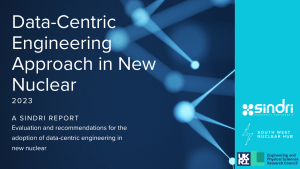A report detailing challenges and recommendations for adopting a digital-centric approach to nuclear engineering and innovation has been published today, with the input and support from companies representing the full range of nuclear sub-sectors.

In June 2022, an event spearheaded by the SINDRI Project (Synergistic utilisation of Informatics and Data centric Integrity engineering) and the South West Nuclear Hub brought together representatives from a range of relevant nuclear sectors (academia, regulators, supply chain, and operators) to assess the need, willingness, and preparedness of the nuclear industry for application of data-centric engineering. The meeting took place at the University of Bristol.
Attendees include The Office of Nuclear Regulation (ONR), Jacobs, CEA, Rolls-Royce, The Henry Royce Institute for Advanced Materials and The University of Bristol and many more. The full list of attendees can be seen below.
The resulting report is a culmination of discussions which produced six key challenges facing the nuclear industry with regard to the adoption of digital innovation, followed by six recommendations which could facilitate the application and adaptation of data-centric engineering approaches in a nuclear setting.
David Knowles, CEO of the Henry Royce Institute said:
“Rapid adoption of digital innovation is a high priority for safety critical industries and we need to move more quickly in the UK. This meeting, stimulated by SINDRI with support from Turing, highlighted many of the challenges we face – its output has been shaped by bringing together academia, industry and the regulators to develop a common understanding of the challenges and opportunities ahead. The day was a great success producing insightful output and I hope people will read the short report and add to the debate.”
The report is representative of the nuclear community’s desire to tackle historic barriers to the development of the UK’s nuclear energy production capabilities; namely cost and pace of development. The report suggests that adoption of new in-silico methods (computer modelling, integrity assessments) used in combination with current material methods will have key benefits across the entire lifecycle of a nuclear power plant (design, construction, operation, and decommissioning). Benefits include cost reduction (design and optimisation can be developed digitally), further improved safety (reduce manual tasks and operation) and connecting processes across the lifecycle.
David Knowles continues:
“We must remember that this is just the start. I’d urge the community to build on this and similar workshops to embrace the opportunities which digital innovation can offer. My hope is that the community will develop a diverse set of generic methods and approaches which will facilitate a new pattern in cross-sector collaboration.”
Synergistic utilisation of Informatics and Data centric Integrity engineering – SINDRI – is a five-year Prosperity Partnership programme, supported by the UKRI and key players in the nuclear industry – EDF, Jacobs, National Nuclear Laboratory (NNL) and UKAEA, with EDF being the primary industry lead. Its vision is to reduce the cost of nuclear power generation through driving change in the processes related to design, fabrication and life-time assessment – all of which have been largely accomplished through manual iteration in the real-world environment. Their work has contributed to various projects including EDF’s multi-physics digital twin, Small Modular Reactor Programme led by Rolls-Royce (through Jacobs and NNL) and the UKAEA’s STEP programme.
Read the Report:
Data Centric Engineering in Nuclear Report 2023
A huge thank you to all the contributors!
List of Attending Institutions
- Henry Royce Institute
- Office of Nuclear Regulation
- Rolls-Royce
- CEA
- Jacobs
- South West Nuclear Hub
- Frazer-Nash
- National Nuclear Laboratory
- PA Consulting
- UK Atomic Energy Authority (UKAEA)
- Bangor University
- EDF
- National Physical Laboratory
- Ada Mode
- Pixel Mill
- Priestland Consulting
- PolyChord
- Jean Golding Institute

[…] To read the full report click here […]